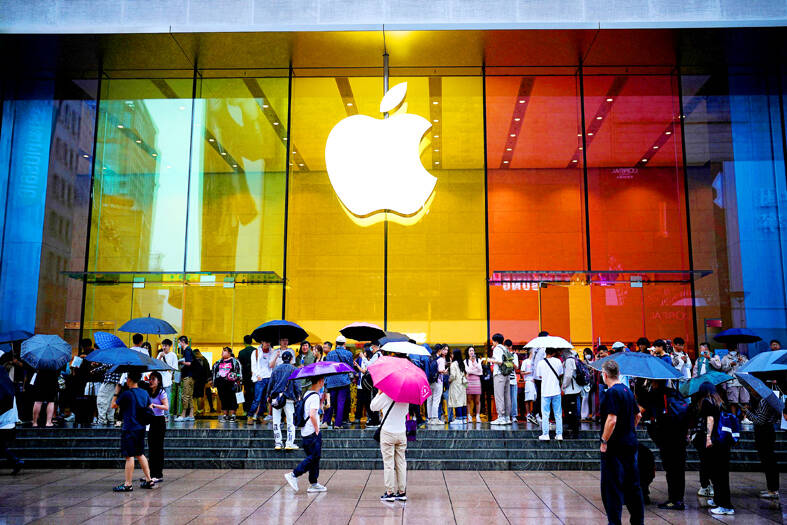Chinese state-backed experts have found a way to identify people who use Apple’s encrypted AirDrop messaging service, according to the Beijing municipal government.
AirDrop allows users to send content to Apple devices in close proximity without an Internet connection, encoded so they cannot be viewed by other people.
The service was widely used by participants in pro-democracy protests in Hong Kong in 2019 that China’s central government eventually quelled.

Photo: Reuters
Apple also limited file-sharing for Chinese iPhone users in 2022 following protests against the ruling Communist Party’s stringent zero COVID policy.
The Beijing municipal government’s justice bureau said experts at the Beijing Wangshen Dongjian Justice Appraisal Institute in the capital had devised a way to reveal an iPhone’s encrypted device log.
From there, they could identify an AirDrop user’s phone number and e-mail accounts, the statement on the bureau’s Web site said.
It said the technique “cracked the tough technological problem of the transmission of inappropriate information with anonymous traceability via AirDrop.”
The method also “raised the efficacy and accuracy of case detection and resolution, and has effectively helped police ascertain several case suspects.”
The statement did not mention whether the technique had led to any arrests or convictions.
Apple did not immediately respond to a request for comment from AFP.
There were widespread reports in late 2022 that people in China were using AirDrop to spread digital leaflets critical of the government.
The transmissions were believed to be partly inspired by a protest in Beijing in which a man hung banners calling for the removal of President Xi Jinping (習近平).
In November of that year, Apple released an AirDrop update that meant users of Apple smartphones in China could only opt-in to receive files from unknown contacts during a 10-minute window before it automatically shuts off. The feature did not previously have a time limit.
The update made it virtually impossible to receive unexpected files from strangers.
Chinese authorities have for years used extensive digital surveillance methods to silence dissent, with most domestic social media apps requiring users to register using their real names.
People must provide proof of identification to purchase SIM cards or install home broadband connections.
Platforms such as Weibo (微博) employ thousands of content moderators and automatically block politically sensitive keywords, such as tennis star Peng Shuai’s (彭帥) name after she accused a senior politician of sexual assault in 2021.
Apple has long faced criticism for making perceived concessions to Xi’s increasingly repressive China.
The company in 2019 removed a Hong Kong map application used by pro-democracy protesters, saying it endangered police, after China warned the tech giant to drop the app.
Apple CEO Tim Cook defended the move at the time, saying the firm had received “credible information” that the app was being used to target individual police officers.
In 2020, Beijing imposed a sweeping national security law on Hong Kong that has all but quashed public dissent in the former British colony.

South Korea’s equity benchmark yesterday crossed a new milestone just a month after surpassing the once-unthinkable 5,000 mark as surging global memory demand powers the country’s biggest chipmakers. The KOSPI advanced as much as 2.6 percent to a record 6,123, with Samsung Electronics Co and SK Hynix Inc each gaining more than 2 percent. With the benchmark now up 45 percent this year, South Korea’s stock market capitalization has also moved past France’s, following last month’s overtaking of Germany’s. Long overlooked by foreign funds, despite being undervalued, South Korean stocks have now emerged as clear winners in the global market. The so-called “artificial intelligence

‘SEISMIC SHIFT’: The researcher forecast there would be about 1.1 billion mobile shipments this year, down from 1.26 billion the prior year and erasing years of gains The global smartphone market is expected to contract 12.9 percent this year due to the unprecedented memorychip shortage, marking “a crisis like no other,” researcher International Data Corp (IDC) said. The new forecast, a dramatic revision down from earlier estimates, gives the latest accounting of the ongoing memory crunch that is affecting every corner of the electronics industry. The demand for advanced memory to power artificial intelligence (AI) tasks has drained global supply until well into next year and jeopardizes the business model of many smartphone makers. IDC forecast about 1.1 billion mobile shipments this year, down from 1.26 billion the prior

People stand in a Pokemon store in Tokyo on Thursday. One of the world highest-grossing franchises is celebrated its 30th anniversary yesterday.

NEW IDENTITY: Known for its software, India has expanded into hardware, with its semiconductor industry growing from US$38bn in 2023 to US$45bn to US$50bn India on Saturday inaugurated its first semiconductor assembly and test facility, a milestone in the government’s push to reduce dependence on foreign chipmakers and stake a claim in a sector dominated by China. Indian Prime Minister Narendra Modi opened US firm Micron Technology Inc’s semiconductor assembly, test and packaging unit in his home state of Gujarat, hailing the “dawn of a new era” for India’s technology ambitions. “When young Indians look back in the future, they will see this decade as the turning point in our tech future,” Modi told the event, which was broadcast on his YouTube channel. The plant would convert